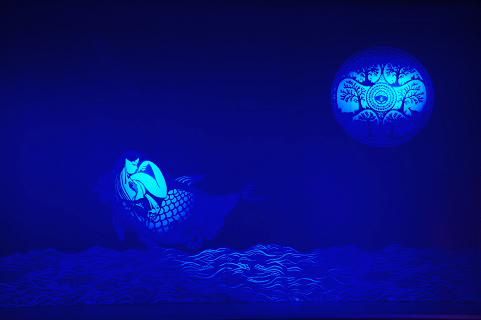 |
|
The opera Snow-white Doves is to be staged in Beijing's Poly Theater on April 16, 2009.
|
Snow-white Doves, a poetic opera featuring Hua'er, a genre of Chinese folk song, will be staged at Beijing's Poly Theater on the evenings of April 15 and 16.
Hua'er is a type of traditional folk music that originated in the northwestern provinces of Qinghai, Gansu and Ningxia.
Snow-white Doves depicts the love of a couple who live beside the vast Qinghai Lake. The hero, Zhao Haiqing, is dragged into the water on his wedding day by the goddess of the lake who, attracted by his singing, has fallen in love with him. Unable to bear the grief of her loss, his wife Ga Dongmei drowns herself. Their love moves the goddess to compassion and she restores them to life as a pair of white doves.
The creators of the opera hope the audience will pay more attention to the music than the simple story. Their aim is to present Hua'er to a modern audience, and they made great efforts to adapt the songs to modern tastes while retaining their essential qualities.
 |
|
The creators of the music opera Snow-white Doves give an ad-lib rendering of Hua'er at a press conference on April 13 in Beijing.
|
"Music is the soul of Hua'er," said "Queen of Hua'er" Su Ping at a press conference to launch the opera on April 13. Su has devoted her life to Hua'er and is eager to bring it to a wider audience. "Traditional Hua'er has strict rules but we decided to relax them to make the songs more accessible," said Su. "I would like to offer my special thanks to composer Zhao Lin, who did an excellent job of adapting the music."
"The story is not that important in opera," said Director Yang Fengliang. "The main thing is that we are looking for new ways to present grass roots folk art."
Staged at a cost of 5 million yuan, the opera has a magnificent set. Nearly 800 paper-cut works create a great visual impact.
After touring the country for several months, the opera will return to Qinghai Province as a showcase for local culture.
(China.org.cn by Huang Shan and Wang Zhiyong, April 14, 2009)